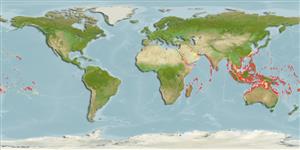Common names from other countries
Teleostei (teleosts) >
Kurtiformes (Nurseryfishes, cardinalfishes.) >
Apogonidae (Cardinalfishes) > Apogoninae
Etymology: Cheilodipterus: Greek, cheilos = lip + Greek, di = two + Greek, pteryx = fin (Ref. 45335).
More on author: Cuvier.
Environment: milieu / climate zone / depth range / distribution range
Ecology
Marine; reef-associated; depth range 0 - 40 m (Ref. 9710). Tropical; 30°N - 32°S
Indo-Pacific: Red Sea to Mozambique (Ref. 4329) and eastward to the Pitcairn Group, north to southern Japan, south to Lord Howe Island and Rapa.
Size / Weight / Age
Maturity: Lm ? range ? - ? cm
Max length : 13.0 cm TL male/unsexed; (Ref. 2158)
Dorsal
spines
(total): 7;
Dorsal
soft rays
(total): 9;
Anal
spines: 2;
Anal
soft rays: 8. Characterized by having dorsal fin rays VI-I, 9; anal fin rays II,8; pectoral fin rays 12; pelvic fin rays I, 5; pored lateral line scales 24-25; predorsal scales 6; circumpeduncular scales 12; large canine-like teeth on jaws; serrated preopercular margin; characterized further by pale grey color to whitish with five narrow black stripes; base of caudal fin yellow; greatest depth of body 3.1-3.7 in SL (Ref. 90102).
Inhabits reef flats and lagoon and seaward reefs to a depth of 40 m or more. Occurs singly or in small to large aggregations, taking shelter in dark crevices, branched coral, under ledges, and among the spines of Diadema setosum. Nocturnal species (Ref. 7300). Feeds on small crustaceans and gastropods, also on small fishes. Generally common (Ref. 9710). Has been reared in captivity (Ref. 35404).
Life cycle and mating behavior
Maturity | Reproduction | Spawning | Eggs | Fecundity | Larvae
Mouthbrooders (Ref. 240). Distinct pairing during courtship and spawning (Ref. 205).
Gon, O., 1993. Revision of the cardinalfish genus Cheilodipterus (Perciformes: Apogonidae), with description of five new species. Indo-Pac. Fish. (22):59 p. (Ref. 8525)
IUCN Red List Status (Ref. 130435)
CITES (Ref. 128078)
Not Evaluated
Threat to humans
Harmless
Human uses
Fisheries: minor commercial; aquarium: public aquariums
More information
ReferencesAquacultureAquaculture profileStrainsGeneticsElectrophoresesHeritabilityDiseasesProcessingMass conversion
Tools
Special reports
Download XML
Internet sources
Estimates based on models
Preferred temperature (Ref.
115969): 24.9 - 29, mean 27.9 (based on 828 cells).
Phylogenetic diversity index (Ref.
82804): PD
50 = 0.5000 [Uniqueness, from 0.5 = low to 2.0 = high].
Bayesian length-weight: a=0.00977 (0.00622 - 0.01535), b=3.06 (2.93 - 3.19), in cm Total Length, based on LWR estimates for this species & (Sub)family-body (Ref.
93245).
Trophic level (Ref.
69278): 3.9 ±0.4 se; based on diet studies.
Resilience (Ref.
120179): High, minimum population doubling time less than 15 months (Preliminary K or Fecundity.).
Fishing Vulnerability (Ref.
59153): Low vulnerability (10 of 100).
